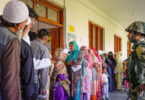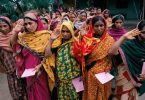Statement by Fourth International Bureau
The coronavirus pandemic is a dramatic public health problem and the human suffering caused will be enormous. Already, in Western Europe, health systems are on the edge of asphyxia. If it spreads massively in countries in the Global South whose already weak or very fragile public health systems have been terribly undermined by 40 years of neo-liberal policies, deaths will be very high.
It is already the most serious pandemic in a century. The number of deaths due to the so-called Spanish flu of 1918-1919, although difficult to estimate, was considerable, striking above all young adults. Its impact was particularly severe coming on the heels of the First World War. The rapid expansion of the Covid-19 pandemic can be explained in particular by the weakening of popular capacity for resistance caused by the neo-liberal order and the rise in precariousness, in a context of the increase in international trade brought about by capitalist globalization, generalized commercialization and the primacy of the law of profit.
This new coronavirus was detected as early as November 2019 in China. The doctors and scientists who tried to raise the alarm were initially repressed and silenced. Had the CCP reacted immediately, the danger of an epidemic might have been nipped in the bud.
The policy of danger denial is not unique to the Chinese regime. Donald Trump in the United States mocked this “foreign virus”. Jair Bolsonaro, with Brazil already immersed in the pandemic, declared that “banning soccer matches is hysteria” and challenged laws and guidelines from health authorities to participate in a demonstration against Justice and Parliament. Boris Johnson in the United Kingdom initially advocated “herd immunization” (allowing the virus to spread so that the epidemic freely reaches its intrinsic limits, when some 70% of the population will be infected). He has had to change this callous and dangerous approach. Sophie Wilmès, Prime Minister of Belgium, for a long time turned a deaf ear to any warning. The French Presidency did not replenish the strategic stocks (protective clothing and products…) as soon as the first cases appeared in January 2020. The governments of the little-affected countries in Eastern Europe are not learning the lessons of the health crisis in the west of the continent. The European Union has not been able to organize the most basic solidarity with hard-hit Italy, even though it does not even produce masks in the country… The main reason for this delay is that governments do not want to jeopardize economic activity and the movement of goods, and to devote only the minimum resources to the protection of populations. The desire to continue with austerity policies in the offensive of capital against labour, the spectre of recession, have been stronger than the preservation of people’s health.
Despite the very rapid progress in medical and scientific research, it is too early to predict the evolution of the SARS-CoV-2 virus: will it be sensitive to the arrival of good weather in the northern hemisphere and will the disease regress? Will it mutate and if so, will it gain or lose virulence? The spread of the disease from China has been on an east-west axis (including Europe, Iran and the United States), where conditions have been favourable. However, the virus is now present in the South as well, where it could multiply, for example at the next change of season, before returning in force to the North. A vaccine will take time to develop. It would be irresponsible to expect Covid-19 disease to die out naturally in the short term.
The virus is spreading very quickly. The ratio of proven cases of infection to the actual number of people affected is unknown in the absence of routine screening tests but its hazardousness is well established. Mortality of the disease may vary from country to country. It is said to be benign in 80% of cases, serious in 20%, including very serious in 5% and fatal in about 2% of cases. The elderly or the sickest are not the only ones in serious danger. Younger and younger people find themselves in intensive care where the epidemic explodes.
The mainstream media and governments focus on the differences in mortality rates by age, but they are careful not to draw attention to class differences and how mortality due to the coronavirus pandemic will affect human beings according to their income and wealth. Quarantine or access to intensive care when you are 70 years old and poor is not at all the same as when you are rich.
There are no antibodies to the new coronavirus in the population. The treatment of the seriously ill is heavy, requiring state-of-the-art equipment and trained, competent medical staff. Failing this (or if the hospital system is overwhelmed), many curable patients are dying and will die. If drastic measures are not taken, if 4 billion people are infected, 80 million people will die.
The Covid-19 pandemic should therefore be taken very seriously by all progressive militant networks, including our organizations. Wherever the epidemic develops, very firm measures to contain it and to protect the populations must be taken, making this a priority above the functioning of the capitalist economy. For all countries the lessons of the those first affected must be learned in order to prepare for its possible development, and to impose real preventive measures on governments.
Strong preventive plans
In most affected countries, because of a lack of preparedness, governments are managing the shortage, sometimes making a virtue of necessity. Where they exist, preventive plans must be strengthened, and established where they do not.
These plans must prepare for the reorganization of the health system as a whole and the mobilization of all necessary resources in the event of an epidemic, and in particular an immediate increase in the personnel of the health services which are already severely understaffed.
Hospitals have been subjected to successive budget cuts, weakened or even privatized, even though they are one of the pillars in the fight against an epidemic, dealing with heavy care. Private services of care, production of medicines and medical equipment must be requisitioned, under public and social control. The Spanish state government has taken the step of requisitioning private hospital beds.
Strategic stocks of protective clothing, hydro-alcoholic gels and screening kits must be established in priority for health and other essential workers and for the most at-risk sectors of the population.
Preventive plans also include medical and scientific research. Here again, however, due to austerity rationales, research funding has been reduced or cut, particularly for coronaviruses. All private companies working in this field must be nationalized under public and social control.
South Korea has shown the usefulness of mass screening tests for understanding the dynamics of the epidemic and intervening as early as possible. However, budgetary constraints have meant that stocks of these test have not been kept up to date even when they existed, creating dramatic situations. In a situation of shortage, the means of protection must be reserved as a priority for health care personnel, who may nevertheless find themselves under-equipped, and their households.
Living conditions must be guaranteed by suspension of rent, mortgage and utility payments. There must be immediate cessation of all evictions, the establishment of shelters with all the necessary facilities for the homeless, the requisition of empty housing so as not to leave people in insalubrious buildings. Those living on the street cannot self-isolate or be in confinement.
The upcoming economic and social crisis, unleashed by the pandemic but prepared by the accumulation of problems in the capitalist economy, should not be the occasion for a further concentration of wealth and destruction of social rights. Rather, progressive forces have to push for solutions based on the redistribution of resources and based on the common good.
Finally, given the soaring epidemic, very strict measures to limit social contact and travel, and thus drastically reduce economic activity, have had to be taken. Plans must therefore include massive aid to the population in order to prevent the rise of impoverishment and to ensure that no one is left destitute in times of health crisis. This must apply both to wage and independent workers. The costs of these restrictions should be borne by increasing taxes on profits and company income, and on the big fortunes.
The vital importance of social self-organization
We must demand that the authorities take all the necessary measures to protect the health and social welfare of the population, but nothing would be more dangerous than relying on them alone. The independent mobilization of social actors is indispensable.
The labour movement must fight for the cessation of all unnecessary production and transport, to ensure that the maximum health safety conditions are respected in the essential workplaces, and that workers’ incomes and contracts be fully maintained in the event of total or partial unemployment. Already strikes have taken place demanding that that workplaces devoted to inessential production, such as cars, be shut down for example in Mercedes Benz, Vitoria in the Basque country. Elsewhere essential workers, in hospitals in France or rubbish collection in Scotland, have taken action to demand better safety conditions.
Local organizations have an essential role to play on many levels. They help to break the isolation in which people can find themselves, notably women, who are likely to find themselves obliged to take on an even heavier burden of domestic and childcare duties during periods of confinement. By combating racism, xenophobia, LGBT+phobia they can make sure that precarious, migrant, undocumented and discriminated minorities are not excluded from the protections to which they are entitled. They can help women for whom confinement means a deadly lock-up with a violent spouse. They can ensure that daily gestures of “social distancing” are respected.
Many instances of grassroots organization at the level of a neighbourhood, a block of flats, with those proposing to help and those needing help (elderly, disabled, in quarantine) making contact, often for the first time, exist in different countries, in Britain, in the Netherlands, in France. In Italy, alongside the practical help, communities have come together to break social isolation and show solidarity through mass singalongs from their balconies.
Social movements must be able to rely on independent medical and scientific expertise to know which measures are effective and indispensable, and encourage international exchange. Doctors and researchers must engage with them.
Finally, the self-activity of the social movement is an irreplaceable democratic guarantee. The authoritarianism of the powers can be reinforced in times of health emergencies, in the name of efficiency. The broadest possible unitary mobilization front must be opposed to this dominant trend.
A global crisis of capitalist society
A pandemic represents a major test for a society. The situation in Lombardy, in northern Italy, is a dramatic illustration of what happens to the dominant order. Lombardy is one of the richest regions in Europe with one of the best hospital systems. This has nevertheless been weakened by neo-liberal policies. It is now drowned by the flood of seriously ill patients, to the point that the Association of Anaesthetists in Resuscitation has given the order to sort out patients and to treat only those with the greatest life expectancy, leaving the others to die.
This is not a one-off situation, such as when first-aid workers have to decide after an accident with multiple victims who to treat first, but a systemic failure that could have been avoided if health policy had been different. In peacetime, shortages are making it necessary to use war medicine in which one gives up trying to save everyone! This is a terrible breakdown of solidarity that is taking place in one of the world’s most economically and health-developed regions – and which may happen elsewhere in Europe tomorrow.
A clear condemnation of the dominant capitalist order
The question is not whether the Covid-19 pandemic will “normalize” itself tomorrow, but at the cost of how many deaths, how much social upheaval. This is a recurring question, because we are living in a time of the return of major epidemics (SARS, AIDS, H1N1, Zika, Ebola…). The chronic state of health crisis is today combined with the global ecological crisis (global warming is one of the facets), the permanent state of war, the instability of neo-liberal globalization and the financialization of capital, the debt crisis, the rise of precariousness and the disintegration of the social fabric, the rise of increasingly authoritarian regimes, discrimination, racism and xenophobia…
Fighting the health crisis requires concretely fighting the dictatorship of transnationals and pharmaceutical lobbies or agro-industry by opposing peasant agro-ecology and agro-forestry that allows the reconstitution of balanced ecosystems. It requires imposing an urban reform to put an end to unhealthy megacities. In general, counterposing to the logic of profit that of free care: any sick person must be treated free of charge, whatever their social status… Our lives are worth more than their profits.
Ecosocialism represents the alternative to this global crisis of capitalist society. The response to the health crisis should be mobilization in convergence with the other fields of struggle to achieve this alternative. Such a convergence of ecosocialist, feminist, workers’ struggles must have as its goal getting rid of the capitalist system that is killing us and the planet and build a new society.
Courtesy International Viewpoint






